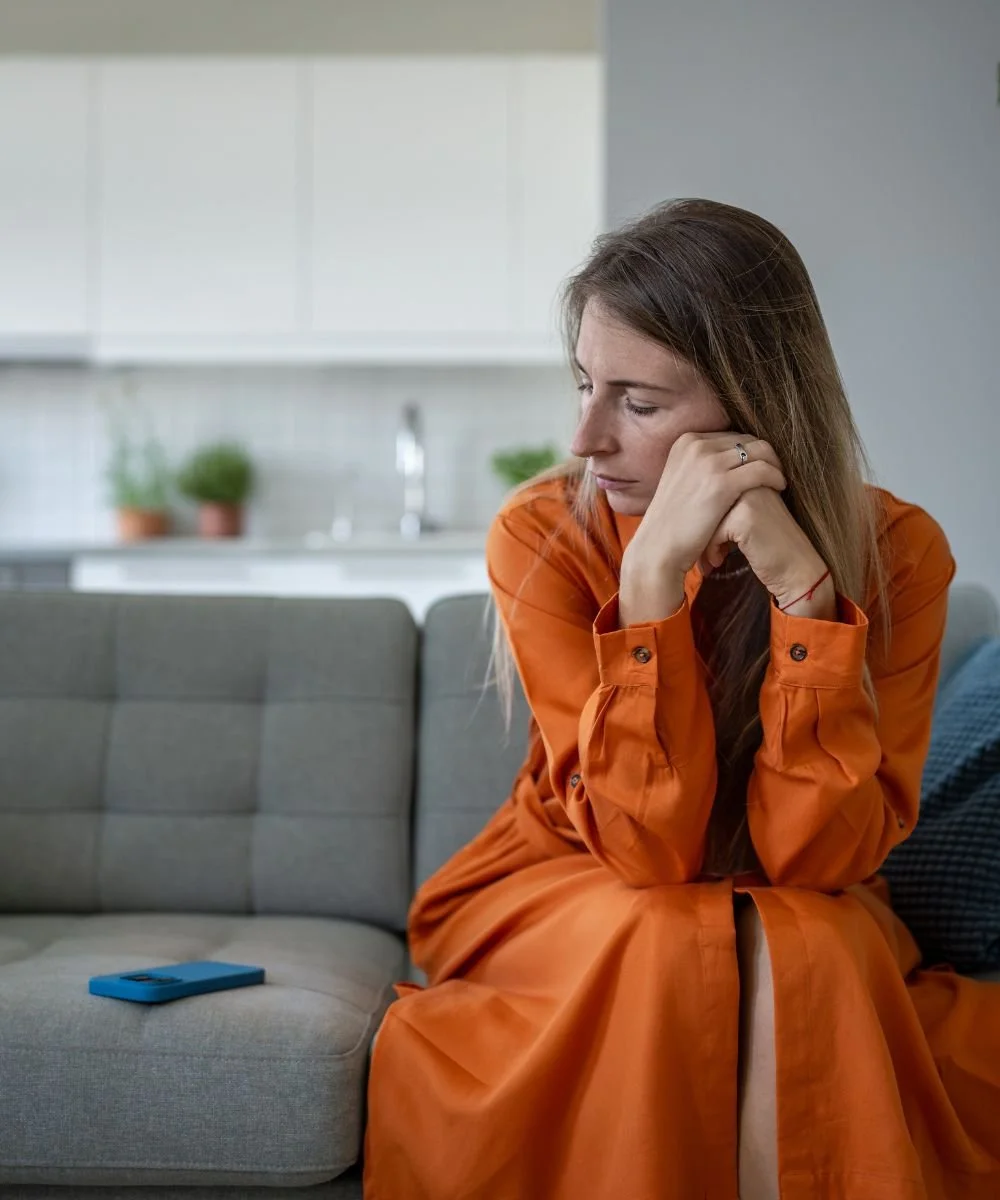Support for Breakups
Have you ever heard a song that instantly takes you back to a moment you never thought you’d survive?
For me, it’s 'In My Place' by Coldplay, and every time I hear it, I’m right back there. I’m transported back to a moment I never thought I’d survive…That breakup….The one that cracked me open.
The pain felt physical—like my chest was being squeezed, burned, and chilled all at once. I wasn’t just sad. I was empty… Food didn’t taste the same. My days were grey. I couldn’t imagine life ever feeling okay again. And still, I remembered exactly why it ended.
This deep ache led me to therapy, where I first heard something that changed everything: “What you're going through is grief."
Breakups Hurt More Than We Talk About—Here’s Why That’s Okay
A breakup can feel like an earthquake in your life — shaking your sense of security, self-esteem, and your vision for the future. Whether you’re navigating the end of a long-term relationship, healing after a painful divorce, or grieving a “situationship” that never fully blossomed, the pain is real — and so is your grief.
I know this both personally and professionally. After my own breakup, I experienced a wave of emotions I hadn’t expected: sadness, anger, loneliness, confusion — even physical symptoms like sleeplessness and fatigue. For a while, it felt like I had lost parts of myself along with the relationship.
And yet — as painful as it was — this ending also became a beginning. It pushed me to reconnect with myself, to heal old emotional wounds, and to rebuild a life rooted in my own values and dreams.
Why Breakups Feel So Devastating
Nobody told you heartbreak would feel like mourning.
When a romantic relationship ends, especially one that meant the world to you, it’s not just the person you’re losing—it’s a whole imagined future, a rhythm of life, a sense of being known. That loss? It’s real. And it deserves space.
Here’s what makes it so hard:
It’s a living loss. You grieve someone who’s still alive, and that can be confusing. You might see them online, run into their name in conversation, or even bump into them—and it reopens the wound.
Your identity shifts. We often shape who we are in a relationship with someone else. After a breakup, you’re not just alone—you’re different.
There’s no script for this grief. You don’t get sympathy cards or time off work. But the heartbreak is real, even if it’s invisible to others.
Breakup Grief Is Real—And It’s a Process
In therapy, I learned that recovering from a breakup is a kind of mourning. And like any mourning, there’s no shortcut. Some days will feel okay. Others will knock the air out of you. And that doesn’t mean you’re broken. It means you’re healing.
Think of it like the flu, my therapist said. You can drink tea, rest, take your vitamins—but some days, you’re just going to feel terrible. There’s no fast-forward button. But there is a way through.
No one prepared me for that kind of pain.
It wasn’t dramatic. There were no fights, no betrayals. Just a calm conversation, lots of tears, and an “I just don’t think this is working anymore” that landed like a slow-motion bomb. I wanted to fight for the relationship, but he had already given up. I sat there, heartbroken, with one question echoing in my head for months: “How do you move on when you still love someone?
Grieving a Relationship You Didn't Choose to End
No one talks about the kind of grief that happens when you weren’t the one who walked away. There are no rituals for this kind of loss. No clear answers. Just you, trying to make sense of how everything changed without your consent..
Surviving a breakup like that feels a lot like living with invisible grief. Life goes on — you still go to work, answer emails, buy groceries — but inside, you’re completely shattered.
The absence of rituals or closure in these situations can make the grief feel more isolating. It’s a loss that’s hard to express, because the world doesn’t quite understand that kind of silent grief.
The Unexpected Symptoms of Heartbreak
Sometimes you don’t even notice it at first, but your body hurts too. A broken heart isn’t just a metaphor. The stress of a breakup activates your nervous system as if you’re facing real danger. You might experience:
Extreme fatigue, even if you’re sleeping a lot.
Trouble concentrating or making even small decisions.
Physical pain in your chest, nausea, appetite changes, binge eating or not eating at all.
Insomnia or waking up multiple times during the night.
Intense mood swings: deep sadness, anger, guilt, even moments of relief — all tangled together.
These symptoms might make you feel like you’re going crazy, but they’re real, and they’re normal. Your body and mind are processing something incredibly heavy
Why the Pain Feels So Real During a Breakup
Breakups are incredibly painful, and the emotional pain can feel just as intense—if not more—than physical pain. This is because your brain processes heartbreak similarly to how it processes physical injury. Let’s take a closer look at why the pain feels so real during a breakup:
-
Your Brain and Heartbreak
When you go through a breakup, parts of your brain that handle physical pain also light up. This is why heartbreak can feel like a real injury—your brain just knows it’s in pain.
-
Loss of Connection
We are built to connect with others. When you're in love, your brain releases a hormone called oxytocin that helps you bond. When that connection ends, it feels like losing someone important. This can lead to feelings similar to withdrawal, making the pain even harder.
-
Stress Response
After a breakup, your body releases cortisol, the stress hormone. High cortisol levels can make you feel anxious and restless. You might have symptoms like tightness in your chest, trouble sleeping, headaches, and stomach issues. Your body feels like it’s in danger, even though the danger is emotional.
-
Loss of Identity
In a relationship, you often share parts of your life with your partner. After a breakup, you lose both that person and the future you imagined together. This can make you feel lost and confused. It’s not just about losing love; it's about losing part of who you are.
-
Conflicting Feelings
During a breakup, you might feel both love and pain. You may still love your ex, but you also know that the relationship needed to end. This makes it hard to move on, even when you know it's over.
-
Memories and Triggers
Your body remembers experiences from your relationship. Certain songs, places, or memories can bring back strong emotions related to your ex. This is why some things can make the pain feel fresh, even after time has passed.
-
Fear of the Future
After a breakup, you may feel worried about what comes next. You might fear being alone or not finding love again. This fear can make the pain feel even worse, touching on deep feelings of isolation and insecurity.
Common Emotions You’ll Feel During a Breakup
Whether it’s the end of a long relationship or a sudden breakup, the emotional aftermath can feel like a storm that doesn’t stop. These emotions can be intense, overwhelming, and downright unpleasant. And that’s okay. It's natural to want to avoid feeling these things, to suppress them, or to push them aside in the hope they’ll go away. The key to healing is not to run from them, but to understand and process them in a way that supports your emotional well-being.
Here are some of the common feelings you might experience during this painful time and how to navigate them:
-
Sadness
It’s completely normal to feel sadness after a breakup. The end of a relationship often means saying goodbye to companionship, comfort, and shared dreams. Take time to grieve this loss—it's a part of healing. Feeling sad doesn’t mean you’re weak; it means you’re human.
-
Anger
Anger can arise when you're hurt or feel wronged. Even if the breakup was mutual, you might find yourself frustrated, questioning what went wrong, or even directing anger at yourself. It's okay to feel angry; what matters is how you process it. Trying to avoid it can just lead to resentment later.
-
Guilt
If you were the one to end things, you might be grappling with guilt. You may question your decision and wonder if you're a bad person. These feelings are common but can be worked through with support. Therapy can help you find clarity and self-compassion, allowing you to move beyond guilt and toward healing.
-
Relief
It may seem strange, but relief is a natural emotion, especially if the relationship was draining or filled with unresolved issues. Recognizing relief as a sign of stepping into a healthier space can be empowering. It's important to accept relief without guilt; it's okay to feel this way.
-
Anxiety
Breakups can leave us anxious about the future. Will I find love again? How do I handle being single? The uncertainty can be terrifying. Therapy can help you process these fears and rebuild confidence in your own worth and future, allowing you to face the unknown with a clearer mind
-
Loneliness
After a breakup, the absence of your partner can create a void. It’s normal to feel lonely, especially if you were used to constant companionship. But over time, you’ll begin to rediscover a deeper connection with yourself. Embrace this opportunity for self-discovery—it’s part of the healing journey
-
Hope
Amidst the heartache, you may start to feel moments of hope. Whether it’s hope for healing or new beginnings, therapy can help you reconnect with that sense of possibility. Hope can guide you through the darkest parts of the breakup, showing you that there is light on the other side.
-
Confusion
Breakups can leave you feeling confused—unsure of what went wrong, how to feel, or how to move forward. This confusion is normal, but trying to avoid it or rush through it can lead to unresolved feelings. With emotional support and guidance, you’ll find clarity and a path forward, one step at a time.
The Best Way to Process a Breakup: Therapy vs. Suppressing Your Emotions
Processing a breakup can feel like navigating through a storm of emotions. Without guidance, this journey can feel overwhelming and disorienting. When we don't address the emotional aftermath, the pain can linger, affecting our overall well-being and future relationships. However, when we choose to process the breakup thoughtfully, especially with therapy, the healing process becomes a path toward growth and self-discovery. Here's how the experience differs when you actively address your emotions versus when you avoid them:
Allow Yourself to Feel
It’s normal to experience a rollercoaster of emotions during a breakup. Sadness, anger, relief, guilt, and confusion might all hit you at once. In therapy, you’ll be encouraged to truly feel your emotions, not push them aside. A therapist will provide a safe space to express yourself without judgment, helping you understand why you’re feeling what you’re feeling.
Without Therapy: You might bury those emotions, feeling overwhelmed or uncertain about how to handle them. Suppressing your feelings could lead to prolonged distress, or even a sense of numbness.
Grieve the Loss
When a relationship ends, you’re not just losing a person—you’re grieving the loss of shared dreams and future plans. Therapy helps you give yourself permission to grieve in a way that feels natural to you, with no expectations of how long it should take.
Without Therapy: You might try to rush through the grieving process, or avoid it altogether. Without space to grieve, those emotions may resurface unexpectedly, leaving you feeling stuck.
Give Yourself Space
Taking time apart from your ex is crucial for gaining emotional clarity. Therapy can help you understand the importance of boundaries and self-care during this time. Your therapist will help you set healthy limits and guide you through rediscovering your personal identity.
Without Therapy: You might find it hard to detach, continuing to follow your ex on social media, or lingering on the idea of reconnecting. This makes it harder to heal and regain clarity.
Reframe the Narrative
Breakups often trigger a focus on what went wrong or what you’ve lost. It’s easy to turn inward and ask, ‘What did I do wrong?’ Therapy will help you reframe that to ‘What can I learn from this?’, which leads to growth and self-compassion.
Without Therapy: You may find yourself stuck in negative thinking patterns, unable to see beyond the hurt. This can keep you feeling trapped in the past, rather than moving forward with new perspectives.
Reconnect with Yourself
A breakup can sometimes make you forget who you are outside the relationship. In therapy, you'll work through rediscovering your identity, your passions, and your worth. With support, you can rebuild your sense of self and learn to enjoy your own company again.
Without Therapy: You may struggle to rediscover yourself, diving into distractions or unhealthy coping mechanisms. This can lead to a sense of emptiness or feeling lost in who you are without the relationship.
Focus on the Future
Therapy can help you shift your focus from loss to the opportunities ahead—new experiences, relationships, and personal growth. You’ll gain the tools to embrace the future with hope and confidence.
Without Therapy: You might feel trapped in the past, unable to imagine life after the breakup. This can prevent you from taking steps forward and creating new, fulfilling experiences.
In therapy, you're not alone in your pain. It's a place where your feelings are validated, your healing is prioritized, and you're supported as you navigate through the ups and downs. On your own, without guidance, you may find yourself stuck in patterns that delay healing. Therapy allows you to process at your own pace, with the support of someone who truly understands.
What Breakup Therapy with Me Feels Like
As a therapist who has walked this path myself—and helped many women navigate the messy, painful, and beautiful process of healing—I bring a mix of clinical expertise and lived experience to our work together. If you’re finding it hard to breathe, to eat, to sleep, to believe you’ll ever feel whole again… I see you. And I can help.
Working with me, you’ll get:
A warm, nonjudgmental space where all your emotions are welcome
A personalized approach that honours your story and the complexity of your breakup
Tools to help you calm your nervous system, sleep better, and regulate big emotions
Support in rebuilding your confidence, your identity, and your capacity for connection
A space to grieve—not just the person, but the future, the hopes, the version of yourself that was tied to that love
Guidance on how to set healthier boundaries, trust yourself again, and move forward at your own pace
This isn’t just about "getting over it." It’s about healing through it. Together, we’ll make space for grief, but also for growth—for the version of you that’s waiting on the other side of heartbreak.
My Therapeutic Approach to Healing Heartbreak
Navigating emotional pain isn’t about simply “moving on”; it’s about understanding yourself more deeply, healing old wounds, and reclaiming your inner strength.
In therapy, we work together to address the root causes of your emotional pain, challenge harmful thought patterns, and rebuild a stronger, healthier connection with yourself. Below are the approaches I use to help you process and heal from heartbreak, empowering you to move forward with greater self-awareness and self-compassion.
-
Past relationships, especially childhood experiences, shape how we connect with others. If you learned that love must be “earned” through self-sacrifice, therapy can help you challenge this belief and create healthier connections.
-
If you’ve been conditioned to believe that prioritizing yourself is selfish, this approach helps you replace guilt with self-acceptance. Learning to soothe yourself instead of seeking external validation builds emotional resilience.
-
Do you catch yourself thinking, “If I don’t make them happy, they’ll leave”? CBT helps you challenge these thoughts and replace them with healthier perspectives, shifting from external validation to internal self-worth.
-
When you’re focused on others, it’s easy to lose touch with your own emotions. Mindfulness and somatic therapy help you tune into your feelings, recognize emotional triggers, and develop a sense of safety within yourself.
-
Codependency often stems from childhood wounds. Inner child work allows you to nurture the younger version of yourself that learned to seek love through self-sacrifice. This process can be transformative in helping you reclaim your emotional independence.
Ready to Begin Your Healing Journey?
It’s easy to feel like a breakup means you failed, or that you're somehow unlovable or "too much" — but the truth is, your heart’s capacity to love deeply is a strength, not a weakness.
If you're struggling after a breakup, know this: you don't have to do this alone. Whether you’re feeling lost, heartbroken, confused, or just tired of pretending you’re fine—therapy can help you feel grounded again.
I work with women who are ready to heal—not by rushing through their pain, but by facing it gently, one step at a time.
Therapy can help you honour that tenderness while also setting new boundaries, redefining your worth, and reclaiming your story. Please know this: you’re not alone. The pain doesn’t vanish overnight, but with time, support, and self-compassion, it transforms. Keep in mind, "It’s not about erasing the past, but rather embracing it as part of your story—one that leads to greater wisdom and strength.”
And one day, maybe folding laundry, cooking dinner, or walking through your neighbourhood, you’ll notice it doesn’t hurt the same way anymore. That something inside you has shifted. And even if they’re gone, you’re still here.
Reach out today to book your first session.
Live Your Life in Full Bloom!
I would be honoured to join you on your journey. Let me help you find your way back to a sense of purpose and direction.







